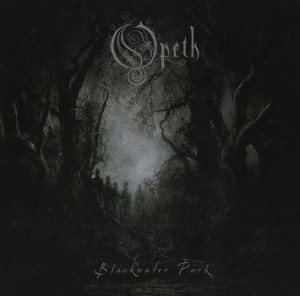
BY ALTUĞ KARAKURT (EE/III)
altug.karakurt@ug.bilkent.edu.tr
A classic album is one that never gets old and can still be enjoyed after numerous listens. To achieve this, the album must be powerful in many dimensions. For example, one can enjoy an album just for its lyrics, but eventually it will probably become boring. However, if the album is densely packed with many successful ideas, even merely grasping each one would take time, such that in the long term one is able to appreciate different aspects in different listens. This is what keeps albums fresh and
enjoyable.
This week, I will review three albums released in the 2000s that have stuck with me for at least five years, thus finding a place among my personal classics. Although I am a fan of a large spectrum of genres, from black metal to classical music to contemporary hip-hop, I find the aforementioned multidimensional approach and musical complexity only in works from the progressive genre. In the long run, I find the change of sound through time found in progressive works to be much more enjoyable than the sonic diversity of classical music, the atmospheric structures of post-rock or the lyrical depth of hip-hop.
Opeth – Blackwater Park
 Opeth is a progressive metal band from Sweden, with which I started my musical passion. Their masterpieces “Watershed,” “Ghost Reveries,” “Damnation,” “Deliverance” and “Blackwater Park” were the very first albums in which I started appreciating details and complexity in music. These albums are filled with groundbreaking, unique musical ideas. Despite its presence among such successful competitors, “Blackwater Park” has always been special for me.
Opeth is a progressive metal band from Sweden, with which I started my musical passion. Their masterpieces “Watershed,” “Ghost Reveries,” “Damnation,” “Deliverance” and “Blackwater Park” were the very first albums in which I started appreciating details and complexity in music. These albums are filled with groundbreaking, unique musical ideas. Despite its presence among such successful competitors, “Blackwater Park” has always been special for me.
Opeth’s earlier releases in the ’90s were very progressive yet, unlike traditional progressive rock from the 70s, very harsh and brutal. Back then, the band’s sound borrowed elements from black metal and merged those with progressive compositions and beautiful acoustic sections. Although the musical ideas were very enjoyable and the band showed amazing potential, there were also many compositional and musical weaknesses, which were very easy to detect. With experience, Opeth managed to perfect their style by softening the sharp transitions, employing denser, even jazzy, polyrhythmic drum patterns and enriching their sound with more creative keyboard and guitar phrases. The band’s style also became softer over the years, and in 2001, they released “Blackwater Park,” which I think was the climax of their career.
This album provides an exceptional musical experience of over an hour without a dull moment. The album’s sound includes various transitions between fast-paced metal-influenced riffs, catchy leading phrases, beautiful acoustic sections and some of the best solo performances of the genre. These transitions are made so smoothly that the entire album feels like a single piece. Despite the complexity of these compositions, the amazing vocal performance of Mikael Akerfeldt and the unique harmony of the basslines, with intense drumming, tie all of the instruments together and save the album from being a potentially very exhausting listen.
Porcupine Tree – Fear of a Blank Planet
 Porcupine Tree was a progressive rock band from the UK and a pioneering figure in the recent wave of the genre. “Fear of a Blank Planet” is one of the band’s most conceptual releases, focusing on the lives of depressed teenagers in the modern era. The storyteller in the album is addicted to technology, while also dealing with bipolar disorder and numbness from the antidepressants he is on. The album is a very dramatic critique from 2007 and feels more and more relevant with every passing day. There is strong commentary about the issues of copyright and piracy, children’s regular exposure to violence and pornography and the deep depression that the younger generation is facing.
Porcupine Tree was a progressive rock band from the UK and a pioneering figure in the recent wave of the genre. “Fear of a Blank Planet” is one of the band’s most conceptual releases, focusing on the lives of depressed teenagers in the modern era. The storyteller in the album is addicted to technology, while also dealing with bipolar disorder and numbness from the antidepressants he is on. The album is a very dramatic critique from 2007 and feels more and more relevant with every passing day. There is strong commentary about the issues of copyright and piracy, children’s regular exposure to violence and pornography and the deep depression that the younger generation is facing.
In addition to the interesting narrative and thought-provoking messages, the album offers a one-of-a-kind cinematic musical journey. “Fear of a Blank Planet” has a run time of 50 minutes and is composed of roughly eight major scenes. The tracks on the album focus on different aspects of the story, and each is supposed to be a different scene. This effect is achieved through the changing rhythms and tones of each song, making the album quite diverse in terms of sound. However, Porcupine Tree manages to conserve harmony by means of the beautiful arrangement of the album and the virtuoso instrumentation. In particular, the climax of the album, “Anesthetize”—a 17-minute-long track with three distinct scenes—has a very dynamic and progressive flow, but still feels like a single piece of work.
Porcupine Tree’s lineup gives it the aspect of a progressive rock supergroup. Moreover, I think this album is one where the virtuosity of each and every member makes a difference. If you are into conceptual or cinematic albums or are a fan of progressive rock, definitely give this masterpiece a listen.
Devin Townsend Project – Addicted!
Devin Townsend is a Canadian producer, songwriter, vocalist and guitarist and is currently a leading figure in the modern progressive/ experimental metal community. In his early career he recorded entire albums as the vocalist for Steve Vai and also released controversial death metal albums with his band Strapping Young Lad. Then, while at the same time focusing on his production and mixing/mastering career, he started his own act as Devin Townsend Band (dtb), subsequently disbanded; in 2009, Devin Townsend Project (dtp) was born.
With such a diverse background, Devin is one of the most creative and unique artists alive today. Influenced by Vai’s style, his death metal background and his years of experimentation in production and mixing with dtb, his own style has finally ripened and flourished in the dtp releases. “Addicted!” is the band’s second album and my absolute personal favorite. The album features Devin’s idiosyncratic layered production, heavy and overdriven guitars and tight drumming. With some of the catchiest and most enjoyable of Devin’s compositions, “Addicted!” is a great summary of the musician’s diverse profile, reflecting each influence and combining them harmonically. Moreover, the album includes amazing vocal work from Anneke van Giensbergen, which alone could have made it a strong candidate for this list.
